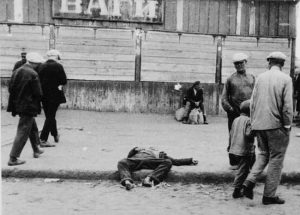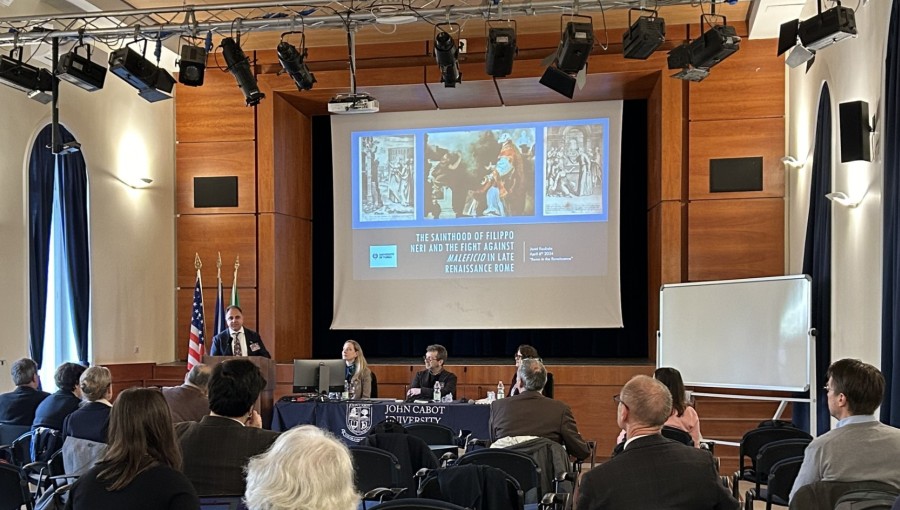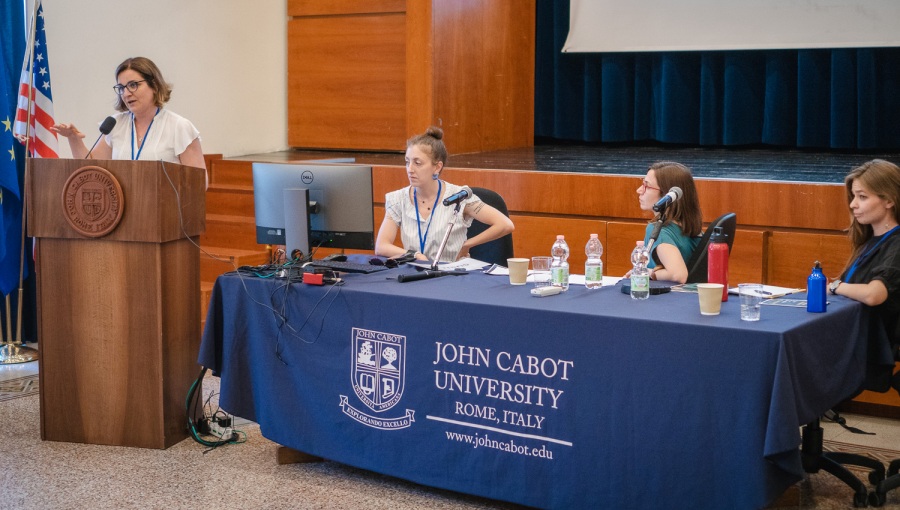Guarini Institute Panel and Film Screening: "The Reporter and the Genocide: Gareth Jones and the Ukrainian Famine of 1932-33"
The Guarini Institute conference hosted by John Cabot University and co-sponsored by Fondazione Liberal focused on different aspects of the Ukrainian Famine of 1932-1933. The morning section opened with a welcoming speech by JCU President Franco Pavoncello, and by the Ukrainian Ambassador to Rome, Mr. Heorhii Chernyavskyi.
Then the panel discussion begun, with a speech by Dr. Karel C. Berkhoff entitled “Ukraine between Stalin and Hitler.” Educated in Amsterdam, at Harvard University (AM), and at the University of Toronto (1998), Dr. Berkhoff is an historian who since 2003 has been working as a researcher and an associate professor at the Center for Holocaust and Genocide Studies, an organization of the Royal Netherlands Academy of Arts and Sciences and the University of Amsterdam. His book Harvest of Despair: Life and Death in Ukraine under Nazi Rule (Harvard University Press, 2004, paperback 2008) was awarded the Wiener Library’s Fraenkel Prize in Contemporary History. His current research focuses on Soviet war propaganda and on sites of Nazi and Soviet mass murder in and near Kiev.
The floor was then passed to Ettore Cinnella, professor of History at the University of Pisa, whose research is focused on Russia and Ukraine before and during the Soviet period. He has published, among others, studies on Ukraine and the anarchist movement during the 1917-1921 turmoil. His presentation described the different and sometimes contrasting interpretations of the Holodomor carried out by international scholars and historians: he shed an important light on the problems regarding the acknowledgments of the causes and consequences of the great Ukrainian famine of 1932-1933.

A picture taken during the Ukrainian Famine of 1932-1933
The morning session eventually featured a remarkable presentation by Nigel Linsan Colley. The great nephew of Gareth Jones, the long-forgotten Welsh journalist who covered and exposed the tragedy of Holodomor, Mr. Colley went over the life and career of his great uncle through the exposition of his diaries, which today represent an invaluable source of documentation over the Soviet policies that led to the tragic events of the Ukrainian Famine in the early thirties. Having travelled across the Ukrainian countryside during the periods of the great famine, the young journalist had reported on the horrifying living conditions of the Ukrainian peasants at a time when Soviet authorities, under Stalin, were carrying out the famous five-year plan for agricultural collectivization. The presentation ended with a discussion over the mysterious causes of the death of the reporter, who was killed by Chinese bandits in 1935 after having uncovered the uncomfortable realities of Soviet policies in Ukraine.
After a lunch break, the afternoon session began with a brief address by Ambassador Giacomo Attolico (ret.), whose father, Bernardo, had represented the Kingdom of Italy to Moscow in 1930-35 and, along with Kharkiv consul Sergio Gradenigo, had described in great detail the tragedy of Ukraine: their reports and dispatches had been buried in the archives of Farnesina (the Italian Foreign Ministry) until a Basilian priest, father Porfiriy Pidruchnyi (who also attended the conference), discovered them in the 1970’s. Next came a presentation by Dr. Yuri Shevchuk, who spoke about the representation of Holodomor by Ukrainian and Soviet cinema.
With a Ph.D. in Germanic Languages (Kyiv State University, 1987), Dr Shevchuk is lecturer in the Ukrainian Language and Culture Department of Slavic Languages and the Harriman Institute at Columbia University. The founding director of the Ukrainian Film Club of Columbia University, he will soon have his article on “Linguistic Strategies of Imperial Appropriation” published in the collective monograph Ukraine on the Cultural Map of Europe, Sharp, April 2009. By illustrating the history of Soviet and Ukrainian cinema during the periods before, during and after the Holodomor, Dr. Shevchuk discussed the role played by cinema in silencing the horrifying realities of the great Ukrainian Famine.
The last part of the conference was dedicated to the screening of the documentary “The Living. Produced in 2008, the documentary was realized by outstanding Ukrainian director Serhii Bukovsky, and John Cabot University had the honor of hosting the European premiere. Shown in original language with English subtitles, it featured a collection of testimonies of those who survived the Holodomor. Coupling artistic merit with invaluable historical documents, the documentary was greatly successful among the audience, which then had the opportunity to discuss it with the director himself and with the producer, Victoria Bondar, who were both present at the conference.





